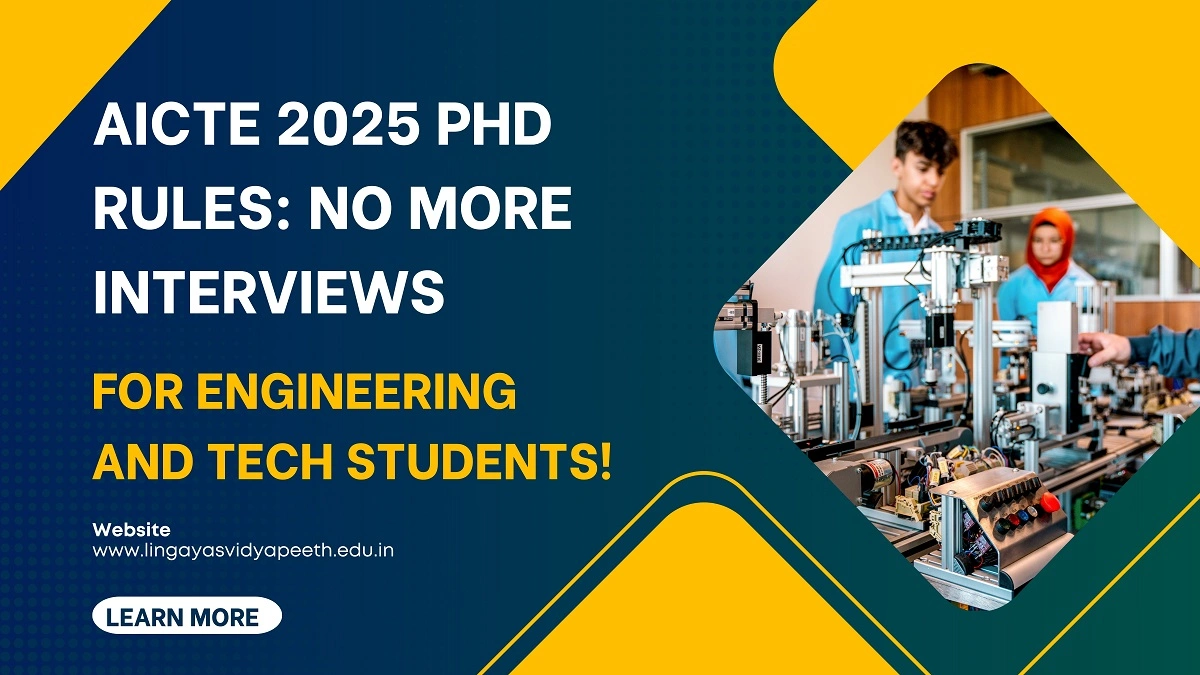Home » AICTE 2025 PhD Rules: No Interviews for Engg, Tech Students

Hey future engineers and innovators! If you’ve been dreaming about getting a PhD in engineering or technology, here’s some great news. The All India Council for Technical Education (AICTE) has announced new PhD rules for 2025 — and they’re a total game-changer.
Guess what? No more stressful interviews!
Now, your admission will depend on your knowledge and effort, not how you perform in a few nerve-wracking minutes. Let’s break it down and see how these changes can make your PhD journey smoother and faster.
In September 2025, AICTE — India’s top body for technical education — released its first-ever guidelines for PhD and Doctor of Science (DSc) programs.
The goal?
To make research more fair, open, and high-quality.
Before this, PhD admissions felt like a tough race. Interviews counted for about 30% of your score, and that often added stress and bias. The new rules remove that step completely.
These guidelines still await final government approval, but experts say it should happen soon. Every year, over 1.5 lakh engineering students in India go for higher studies, and these new rules could help many more enter research.
AICTE also wants India to match global research powerhouses like the US — where PhD researchers drive most AI and tech breakthroughs. The new system focuses on skills, fairness, and innovation.
This is the biggest and happiest change.
From now on, PhD admissions in engineering and tech won’t have interviews. Your selection will depend on your written test and academic performance.
That means:
Admissions will happen twice a year — in July and January — so you’ll get two chances annually.
Plus, if you’re already working, here’s another win: 20% of PhD seats will be reserved for professionals with industry experience. Imagine working and doing your PhD at the same time — super flexible.
AICTE now says that every PhD student must publish at least two research papers in top journals before submitting their thesis.
These should be in Scopus-indexed journals — the kind that publish serious, high-impact research.
It might sound tough, but it’s actually great practice. You’ll learn how to share your work with the world early, just like professional scientists.
Fun fact: Before 2025, only 40% of PhD students in India published research during their course. Now, that number will shoot up — helping your work get noticed in areas like AI, robotics, and green energy.
So start small — join your college lab or online research groups. By the time you graduate, your résumé will already shine.
Time matters when you’re eager to build the future.
Earlier, PhDs usually took 3–5 years to finish. Under the 2025 rules, you can complete yours in just 2.5 years if you meet your publication goals early.
That’s not cutting corners — it’s just smarter planning.
Research from IITs shows that fast-track PhD graduates get 25% more job offers from tech firms. Imagine being 25, holding a PhD, and leading innovation projects at startups like Flipkart or Tesla India.
There’s more:
And yes, AI tools like ChatGPT can help in research — but you must declare them. Honesty keeps your work credible and respected.
The Doctor of Science (DSc) degree is for researchers who’ve already made big contributions after their PhD.
To qualify, you’ll need:
Only a small number of researchers go for DScs, but these new rules make the title even more respected.
It’s something to aim for — proof that your research can truly change the world.
These aren’t just new guidelines — they’re your launchpad into the future.
Here’s what you gain:
India aims to have 10,000 PhD holders in STEM by 2030 as part of the “Make in India” mission — and you could be one of them.
Need help finding a mentor?
AICTE’s new portal connects students with guides, webinars, and research support.
| Aspect | Old Rules | New 2025 Rules |
| Interviews | Mandatory | Removed |
| Minimum Duration | 3–5 years | 2.5 years |
| Publications | Optional | At least 2 required |
| Admission Rounds | Once a year | Twice a year |
| DSc Eligibility | Not defined | 10+ years post-PhD, major work |
See the difference? The new rules clearly win.
The AICTE 2025 guidelines make your PhD dream more reachable than ever — fairer, faster, and focused on real talent.
So what’s next?
What do you think — are you ready to skip those interview jitters and dive straight into research? Drop your thoughts below and share this with your friends who dream big in tech.
Together, let’s build the next generation of Indian innovators.
Also Read
AIBE 20 2025: Dates, Registration, Syllabus & Tips for Aspiring Lawyers
Common Law in Business
2025 World Para Athletics Championships in New Delhi
International Law in Business
Global MBA vs Traditional MBA in India: Which One Is Best?
RECENT POSTS
CATEGORIES
TAGS
Agriculture Agriculture future AI Architecture artificial intelligence Bachelor of Commerce BA English BA Psychology BTech AIML BTech CSE BTech cybersecurity BTech Engineering Business management career Career-Specific Education career guide career option career scope Civil engineering commerce and management Computer Science Computer science engineering Data science degree education Engineering Engineering students English Literature english program Fashion Design Fashion design course Higher Education Journalism journalism and mass communication law Law career Machine Learning mathematics MBA MBA specialization Mechanical Engineering Pharmacy Psychology Research and Development students
LV only conducts physical/online verification of any document related to examination on the following email id:
It is important to note that the following email IDs and domains are fraudulent and do not belong to our university.